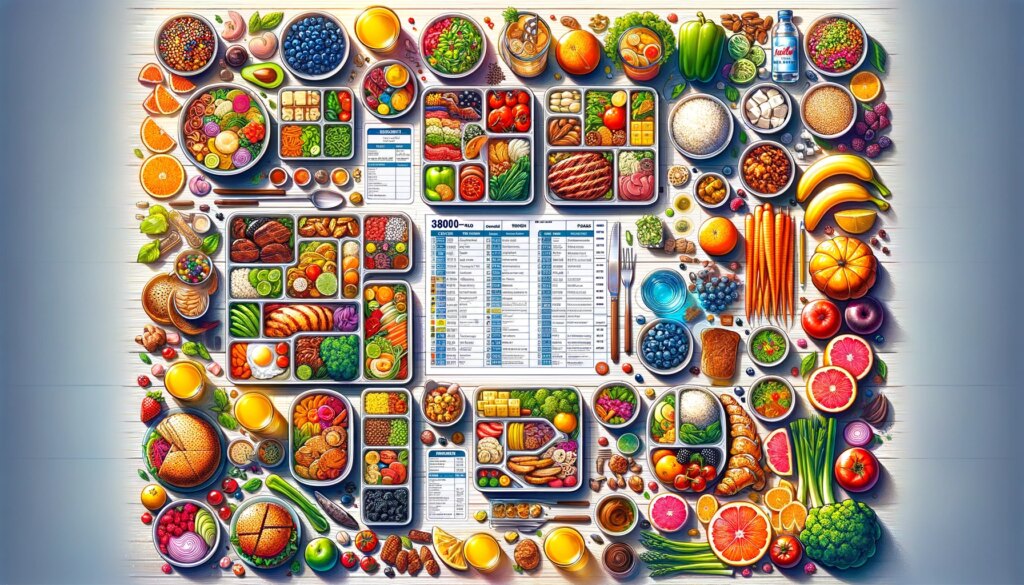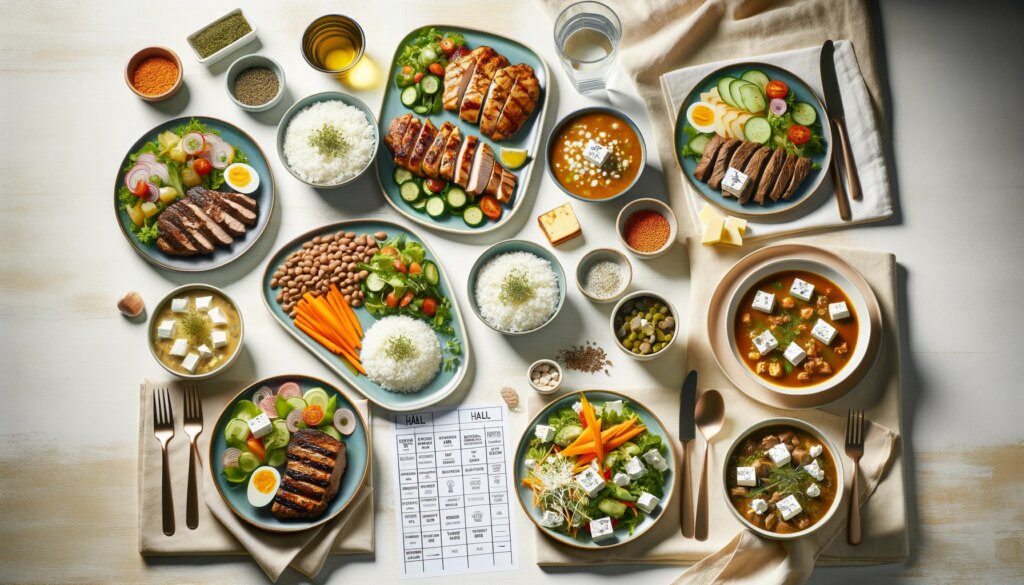Introduction to Effective Meal Planning
Embarking on a journey towards a healthier lifestyle requires a well-thought-out meal plan. Whether your goal is to gain muscle, lose fat, or maintain your current weight, understanding how to create a meal plan is crucial. This article delves into the specifics of designing a 3800-calorie meal plan, strategies for cutting fat, and adhering to halal dietary practices.
Crafting a 3800 Calorie Meal Plan
A 3800-calorie meal plan is typically geared toward individuals with high energy requirements. These could include athletes, bodybuilders, or those engaged in heavy physical labor. The key to a successful 3800-calorie meal plan lies in balancing macronutrients – proteins, carbohydrates, and fats – to ensure that your body receives the fuel it needs for optimal performance.
Meal Plan for Cutting Fat
Losing fat while preserving muscle mass is a common goal for many. A meal plan for cutting fat involves creating a calorie deficit while ensuring adequate nutrition. This means consuming fewer calories than your body burns in a day. High-protein, lower-carb meal plans are often effective for fat loss, as protein helps maintain muscle mass and keeps you feeling full longer.
Understanding Halal Meals
Halal meals adhere to Islamic dietary laws, which dictate certain methods of slaughtering animals and forbid the consumption of specific foods and beverages. A halal diet is not just about religious compliance but also focuses on consuming wholesome and pure foods.
Halal Meal Replacement Shakes
For those on the go, halal meal replacement shakes offer a convenient way to adhere to halal dietary requirements. These shakes are designed to provide a balanced meal’s worth of nutrients, including vitamins, minerals, proteins, and carbohydrates while ensuring all ingredients are halal-certified.
Halal Diet Meals
Incorporating halal diet meals into your daily routine requires mindfulness about the ingredients used. Halal diet meals are diverse, ranging from meat-based dishes to vegetarian options. The emphasis is on fresh, unprocessed foods, making it a wholesome choice for anyone looking to improve their dietary habits.
Meal planning, whether for a 3800-calorie diet, fat-cutting, or following halal practices, is a strategic process that requires understanding your dietary needs and goals. By focusing on nutrient-rich foods and proper portion sizes, you can create a meal plan that supports your health and fitness objectives while respecting your dietary preferences.
This article provides a detailed overview of each topic, ensuring it’s both informative and aligned with SEO best practices.
Read also: Crafting Wholesome Halal Meal Plans: A Journey to Nutritious and Delicious Eating
Creating a 3800-calorie meal plan involves carefully selecting foods that can provide the necessary nutrients while also meeting the high-calorie goal. This plan is typically suitable for individuals who have very high energy expenditure, such as athletes or those engaged in heavy physical labor. It’s important to balance macronutrients (carbohydrates, proteins, and fats) and micronutrients (vitamins and minerals) to ensure a well-rounded diet.
Breakfast (Approx. 1000 Calories)
- Oatmeal (2 cups cooked): Oatmeal is a great source of complex carbohydrates and fiber. Adding nuts or seeds can increase the calorie content.
- Protein Smoothie: Blend whey protein or a plant-based alternative with a banana, a scoop of peanut butter, and whole milk or a milk substitute.
- Greek Yogurt with Mixed Berries and Honey: This provides a good mix of protein, healthy fats, and simple carbohydrates.
Mid-Morning Snack (Approx. 500 Calories)
- Trail Mix: A combination of nuts, seeds, and dried fruits. It’s calorie-dense and provides a mix of healthy fats, proteins, and carbohydrates.
- Whole Fruit: Such as an apple or banana for additional fiber and micronutrients.
Lunch (Approx. 1000 Calories)
- Grilled Chicken Breast or Tofu: Serve with a quinoa or brown rice base.
- Steamed Vegetables: Such as broccoli, carrots, and bell peppers for vitamins and minerals.
- Avocado Salad: Include mixed greens, tomatoes, cucumber, and a generous serving of avocado with olive oil dressing.
Afternoon Snack (Approx. 400 Calories)
- Whole Grain Bread Sandwich: With turkey, cheese, and a slice of tomato and lettuce. Alternatively, a vegetarian option with hummus and roasted vegetables.
Dinner (Approx. 900 Calories)
- Salmon or Lentil Patty: Both are excellent sources of protein; salmon provides healthy omega-3 fatty acids.
- Sweet Potato: Baked or mashed, sweet potatoes are rich in complex carbohydrates and fiber.
- Mixed Vegetables: A stir-fry with a variety of colorful vegetables cooked in olive or coconut oil.
Evening Snack (Approx. 400 Calories)
- Cottage Cheese or Plant-Based Yogurt: With a handful of nuts and a drizzle of honey or maple syrup.
- Dark Chocolate: A small piece for a treat, which also provides antioxidants.
Hydration
- Drink plenty of water throughout the day. Hydration is essential, especially for those with high activity levels.
Supplements
- Depending on individual needs and dietary restrictions, a multivitamin or specific supplements like Omega-3, Vitamin D, or Iron might be necessary.
Notes
- Flexibility: This plan can be adjusted based on dietary preferences, such as vegan or gluten-free requirements.
- Portion Sizes: Portion sizes should be adjusted to meet individual needs and to ensure the total calorie count is met.
- Meal Timing: Distributing meals and snacks throughout the day can aid in managing hunger and energy levels.
Consultation with a Dietitian
It’s advisable to consult with a registered dietitian or nutritionist when undertaking such a high-calorie diet, especially to ensure that it’s balanced and aligns with your health and fitness goals.
Read also: Crafting Wholesome Halal Meal Plans: A Journey to Nutritious and Delicious Eating

